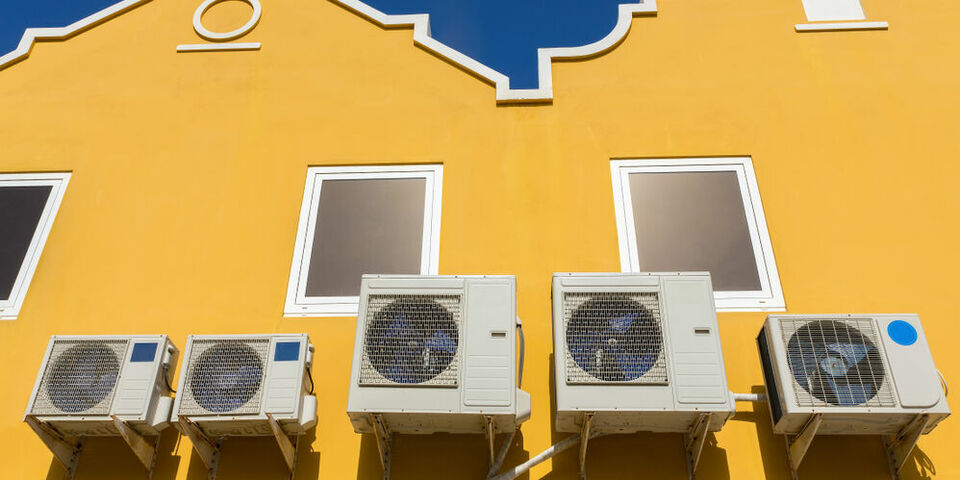Prof Talk | Two clicks away from cool
With the summer in sight and the prospect of having to work from home in a sweltering attic room looming large there's one decision that seems simple. In recent years sales of air conditioners have risen sharply, but as we cope with working from home during these corona times even more people are buying them. Don't make a hasty choice, warn three TU/e experts. Having an energy guzzler at home isn't smart for the climate or your wallet. Fortunately, there are other ways to make working from home in the heat more pleasant.
While working from home has many benefits, on tropical days it is impossible not to miss the office air con. After all, it isn't easy to give a good account of yourself in an important online meeting when your head is hot and your armpits dripping. So buying an air con unit is an easy step; sales of cooling systems will rise by some 40 to 50 percent this summer, the sector association for ventilation and cooling technology reported last week. But what does this increase mean for our energy supply, and on hot days can we cater for the peak in energy demand in a sustainable way?
“We are seeing a growing demand for electricity,” says Professor David Smeulders of the Energy Technology section at the Department of Mechanical Engineering. “Think of datacenters, electric cars, and heating our homes now that we have to get off natural gas. In this sense, air con units are part of a well-established trend. But it is certainly worrying. The terms of the Climate Agreement are based on the notion that in the run-up to 2030 our electricity consumption will not increase. Factoring in air con sales, this seems to me to be increasingly unrealistic.”
Good air extraction
Certainly mobile air con units - which in theory can be placed anywhere in a room - consume considerable energy, says Han Slootweg, professor in Smart Grids at Electrical Engineering. “Even with average use, you're talking about something like 400 kWh per year; in other words 10 percent of the total consumption of an average household. Moreover, the hazard of a mobile air con unit is that people often don't bother to set up good air extraction. As you can imagine, an open window in 30-degree heat with a hose hanging over the sill doesn't do your energy consumption any favors.” A split system with fixed indoor and external components uses less energy, but even this should be used sparingly if you want to avoid it bumping up your energy bills. That's a big ask; once it has been installed the temptation to keep your room comfortably cool the whole time is pretty strong.
This coming summer we will surely see the hike in energy demand caused by air con units, Smeulders expects. For the time being we can cater for the air con peak, but unfortunately we aren't doing it in a 'green' way. “It is only thanks to the gas power stations that we have enough capacity. The sustainable supply of electric power is still too limited in the Netherlands; we are now at roughly 8% wind power and 3% solar power. But if consumption outstrips our 'green' supply, we'll be taking a step back. And this is a losing battle: our increased use of air con causes us to use up more fossil fuel, more CO2 is released, it gets hotter on earth and so we go out and buy more air con units.”
Solar panels
The combined purchase of air con and solar panels would be a good step towards breaking this vicious circle, points out Professor Erwin Kessels of Plasma Materials & Processing (AP). “As a private individual you can certainly use solar cells to compensate for your air con; we are seeing big differences in yield between summer and winter. Though it must be said that the standard crystalline silicon panels are a little less efficient when they warm up. During a heat wave thin-film panels have a higher yield, but then again their yield per square meter is a little lower. If you have a small roof, you are best off having high-efficiency cells. And if you install a few more at the outset, as well as your air con use, you can earn back the rest of your energy consumption.”
Reduce consumption
Nonetheless, solar panels must not become an excuse for consuming extra power, Smeulders believes. “Everything that you don't consume doesn't need to be generated and transported. Smart combinations are good, but what we need to do is reduce our consumption. Certainly when it comes to new builds, a whole host of design features are available that can be built in to create a climate-resistant house, thereby avoiding the need for afterthoughts, quick fixes like air con units.”
Slootweg has another tip for the homeworker. “Place an ice pack in front of your fan, it will give the same cooling feeling as an air con unit. And now that we are being a little more flexible, you can work at home early in the morning or late in the evening, and use the heat of the day to go outdoors in search of cool - Kessels laughs as he acknowledges, “I have never been so tanned.” Two clicks is all it takes to buy an air con unit, Slootweg concludes, but it certainly wouldn't do any harm to keep a cool head so that you aren't left with a discarded energy-guzzling machine once we are able to get back to the office.





Discussion